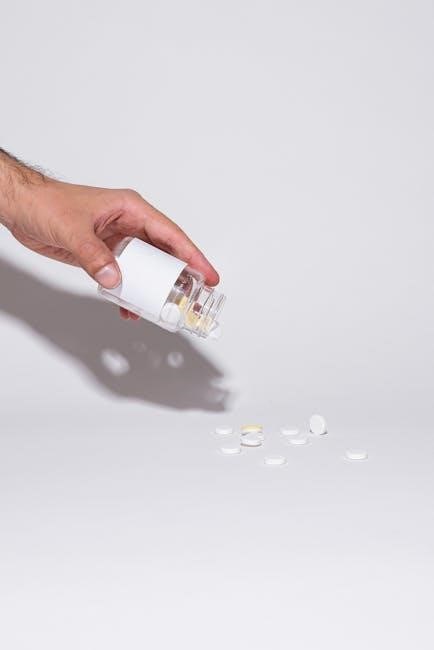
Howard Pittman’s “Placebo” delves into the fascinating science behind the placebo effect, exploring its profound impact on human health and medical understanding;
Overview of the Book and Its Significance
Howard Pittman’s “Placebo” offers a compelling exploration of the placebo effect, challenging conventional medical understanding. The book delves into the mind-body connection, showcasing how beliefs and expectations influence health outcomes. Pittman’s unique perspective blends scientific research with real-world examples, making the concept accessible to a broad audience. By examining the ethical and practical implications of placebos, the book highlights their potential to transform healthcare practices. It serves as a thought-provoking resource for both medical professionals and general readers, encouraging a deeper understanding of human physiology and psychology.

The Concept of the Placebo Effect
The placebo effect is a phenomenon where inert substances or treatments produce measurable, positive effects due to belief and expectation, highlighting the mind-body connection’s power.
Definition and Historical Background
The placebo effect is a phenomenon where inert substances or treatments trigger measurable, positive outcomes due to belief and expectation. Originating from the Latin word “placēbō” (“I shall please”), it has evolved from ancient healing practices to modern medical research. Initially dismissed as mere suggestion, the placebo effect gained scientific credibility in the 20th century. It highlights the mind-body connection, showing how psychological factors significantly influence physical health, making it a cornerstone in understanding the complexities of human physiology and treatment responses.
The Role of the Placebo Effect in Medical Research
The placebo effect plays a critical role in medical research as a control mechanism to assess the efficacy of new treatments. By comparing outcomes between experimental and placebo groups, researchers isolate the impact of the intervention itself. This method ensures that observed effects are not due to patient belief or external factors. Placebos validate research findings, enhancing the reliability of clinical trials and guiding the development of safe and effective therapies.

Howard Pittman’s Perspective on the Placebo Effect
Pittman explores the placebo effect’s profound connection to the mind-body relationship, emphasizing its scientific validity and transformative potential in healthcare.
Key Insights from the Book
Howard Pittman’s “Placebo” offers profound insights into the placebo effect, revealing its scientific basis and psychological mechanisms. Pittman explores how belief and expectation influence health outcomes, challenging traditional medical approaches. He highlights the mind-body connection as a powerful tool for healing, supported by real-world examples and studies. The book also discusses ethical implications and the potential of placebos in modern medicine, urging a more holistic understanding of human health.
Pittman’s Arguments on the Power of the Mind-Body Connection
Pittman emphasizes the transformative potential of the mind-body connection, arguing that belief and expectation significantly influence physical health. He contends that the placebo effect demonstrates how psychological factors can trigger measurable physiological changes, challenging conventional views of medical treatment. Pittman advocates for a holistic approach to health, suggesting that harnessing the mind’s power could revolutionize medicine and empower individuals to take greater control of their well-being.

Scientific Understanding of the Placebo Effect
The placebo effect is a phenomenon where inert substances produce measurable physiological changes, highlighting the brain’s role in health and recovery through expectation and belief.
Neurological and Psychological Mechanisms
The placebo effect is driven by complex neurological and psychological processes. The brain’s prefrontal cortex, anterior cingulate cortex, and basal ganglia play key roles, modulating pain, emotion, and reward. Neurotransmitters like dopamine, endorphins, and serotonin mediate these effects, creating a biological response to expectation. Psychologically, belief, conditioning, and emotional states amplify the impact, demonstrating the mind-body connection’s power. Studies show that placebos can reduce pain, alter immune responses, and even influence motor skills, highlighting the profound interplay between perception and physiology.
Studies and Examples Illustrating the Placebo Effect
Studies demonstrate the placebo effect’s significant impact across various fields. In pain management, placebo treatments have shown up to 30% reduction in pain intensity. Notably, a 2010 study revealed that patients receiving placebo surgery for knee pain experienced identical recovery rates to those undergoing actual surgery. Similarly, in depression trials, placebos often yield substantial improvement, highlighting the brain’s ability to respond to expectation. These examples underscore the profound influence of belief on physiological outcomes, a theme Pittman explores in depth.

Implications of the Placebo Effect in Modern Medicine
The placebo effect highlights the mind-body connection’s potential to reduce medical costs and enhance treatment outcomes, offering alternative therapies and deeper insights into patient care strategies.
Ethical Considerations in Medical Practice
The placebo effect raises significant ethical questions in medicine, particularly regarding informed consent and transparency. Using placebos in clinical trials and practice requires balancing therapeutic benefits with patient trust. Healthcare providers must weigh the potential advantages of placebos against the risk of misleading patients, ensuring that treatments remain respectful and ethical. Open communication about placebo use is crucial to maintaining trust and upholding medical integrity, as patients have the right to know what they are receiving. This ethical dilemma challenges the medical community to navigate the fine line between effective treatment and honest practice.
The Role of Placebos in Clinical Trials
Placebos play a critical role in clinical trials as controls, allowing researchers to measure the efficacy of new treatments accurately. By comparing outcomes between placebo and active treatment groups, scientists can isolate true therapeutic effects from psychological responses. Ethical guidelines ensure participants are fully informed, maintaining trust and integrity in the process. This methodological cornerstone ensures that only safe and effective treatments advance, safeguarding public health and advancing medical science responsibly.

Case Studies and Real-World Applications
Real-world applications of the placebo effect, as explored by Howard Pittman, highlight its significant role in pain management and mental health, offering insights into mind-body healing.
Notable Examples of the Placebo Effect in Various Fields
The placebo effect has been widely observed in medical research, particularly in painkiller and antidepressant trials, where inert treatments often yield significant benefits. In neuroscience, studies show that placebos can alter brain activity, mimicking real treatments. Similarly, in alternative medicine, placebo responses are common, highlighting the power of belief. Notably, in Parkinson’s disease research, placebos have led to measurable improvements in motor function. These examples underscore the placebo effect’s relevance across diverse medical and therapeutic fields, demonstrating its profound impact on human physiology and psychology.
Success Stories and Controversies Surrounding Placebo Use
The placebo effect has yielded remarkable success in pain management and Parkinson’s disease studies, where significant improvements were observed. However, controversies arise from ethical concerns, such as withholding active treatments in clinical trials. Critics argue that using placebos can delay access to effective therapies, while proponents emphasize their role in establishing treatment efficacy. These debates highlight the complex balance between scientific rigor and patient welfare in medical research and practice, sparking ongoing discussions in the scientific community.
The Future of the Placebo Effect
Advancing research on the placebo effect may revolutionize personalized medicine, integrating mind-body therapies and digital innovations to enhance treatment outcomes while addressing ethical challenges in patient care.
Emerging Research and Potential Applications
Emerging research on the placebo effect explores its integration with digital health tools and AI, offering personalized treatment strategies. Studies suggest potential applications in chronic pain management and mental health, leveraging neuroplasticity to enhance therapeutic outcomes. Pittman highlights how understanding the mind-body connection could revolutionize non-invasive treatments, reducing reliance on pharmaceuticals. These advancements aim to bridge the gap between psychology and physiology, opening new avenues for holistic healthcare approaches. This innovation could significantly improve patient care and treatment efficacy worldwide.
The Evolution of Placebo Studies in the Digital Age
Digital advancements have transformed placebo research, enabling deeper insights into its mechanisms. AI-driven tools now analyze vast datasets to predict placebo responses, while wearable devices track real-time physiological changes. Virtual reality experiments simulate therapeutic environments, enhancing study precision. These technologies not only improve understanding but also pave the way for personalized medicine. The integration of digital health tools into placebo studies is revolutionizing how researchers approach mind-body interactions, offering new possibilities for treatment development and patient care in the modern era.
Howard Pittman’s “Placebo” offers a compelling exploration of the placebo effect, highlighting its profound implications for medicine, psychology, and human health, inspiring further research and reflection.
Howard Pittman’s “Placebo” masterfully unravels the complexities of the placebo effect, revealing its profound implications for medicine, psychology, and human health. By bridging science and philosophy, Pittman demonstrates how the mind-body connection influences healing, challenging traditional medical perceptions. The book underscores the ethical dilemmas surrounding placebos in clinical practice and their potential to revolutionize healthcare. Ultimately, Pittman advocates for a deeper understanding of this phenomenon, urging further research to harness its power responsibly and effectively in modern medicine.